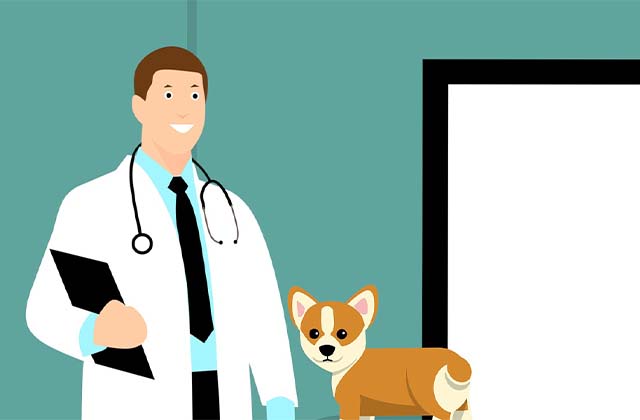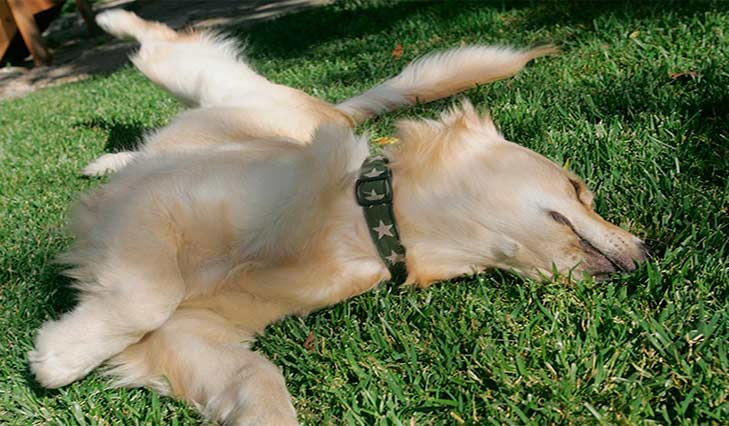Will My Dog Forgive Me For Hitting Him? Frequently Answered
First, will my dog forgive me for hitting him?
Yes, provided it’s a one-time thing and you don’t do it often!
Every dog breed matures at a different age; some as young as six months and others as old as two. They need to be taught how to act like adults because they are growing both physically and mentally at this time.
Puppies require direction and training. She instructs them in proper behavior while they are with their mother. She will nudge or nip them on the rump to correct them if one is being disrespectful to its siblings or crosses a line.
You have the duty to teach this little furball some manners when they leave their mother.
Please continue reading as I explain the specific information in the post.
Table of Contents
What If I Hit My Dog, Will He Forgive Me?
Dogs lack the mental capacity for forgiveness, and this is a scientific fact. Dogs see the world in black and white: their world is ruled by cause and effect: if they have a bad experience, they try to avoid it in the future.
The concepts of right and wrong are also foreign to dogs. Once more, they risk drawing your ire if they are caught doing something wrong. Fido may make the connection between the two things if you yell at him or even smack him for tearing your sofa cushion to pieces, but it won’t necessarily stop him from doing it again.
So, no, dogs won’t actually forgive you because they don’t understand the concept. All will be well between you and your dog, though, as soon as you compliment it on being a good boy or girl.
Dogs are perceptive beings who constantly pick up on our moods. Nevertheless, regardless of the words you use, the tone of your voice has the greatest impact.
Despite the fact that he might be hesitant to approach you at first after getting smacked, your furry best friend will soon be wagging his tail and smothering you in kisses.
The Ups And Downs Of Being A Pet Parent
It’s a wonderful privilege to share your life and your home with a dog, but it’s also a huge responsibility.
The affection and love they show you, along with all the laughter and fun, can be overwhelming on some days. On other days, when your dog pushes all the wrong buttons, it can be difficult. Even the most intelligent dog on earth makes mistakes occasionally!
Perhaps you had one of those days? Perhaps your canine companion pushed its luck and quickly devoured the snack you left on the kitchen counter? Or perhaps they broke a favorite vase, chewed up your best shoes, dug up your perfect flower beds, or had a bathroom accident all over your expensive rug.
You may have hit your dog because of one of these situations, or something similar. And right now, guilt is consuming you.
You want to know, will my dog forgive me for hitting him (or her)?
We’ve covered the basics of this subject, but let’s learn more about dog behavior and physical punishment.
If You Hit A Dog, Will They Forgive You?
As we now know, dogs can’t actually forgive you, but they understand when you’re angry and when you’re not.
Whether or not this was a repeated incident or a pattern of behavior will determine how quickly you recover from being hit. In a moment of rage and frustration, you may have smacked your dog, only to immediately regret it.
Although never ideal or a good idea, this is understandable.
Let’s be clear right away: kicking, punching, spanking, or hitting your dog with a stick, slipper, or any other hard object is abusive behavior, especially if it happens regularly.
It strongly implies that you have no right to own a dog in the first place, aside from breaking animal welfare laws.
Leader Of The Pack
Dogs are pack animals that thrive in social environments. They enjoy social interaction and have been bred specifically to do well in human company.
The role of the alpha, the pack leader, will be assumed by you or a member of your household. You will always have your dog’s love and devotion.
In many cases, it could even be described as pathetic. This is not meant as an insult; some dogs will continue to seek out their owners’ love and approval despite being severely punished.
Their instinct to appease the alpha is behind everything, which is pathetic in the truest sense of the word.
Anger Is Weakness
Dogs view anger as a sign of weakness, according to research. Your dog will stop respecting and trusting you if you smack him around all the time when you are angry with him.
The issue is that your relationship ends up being based on fear, which is the exact opposite of what a true dog lover wants.
So, yes, your pooch will forgive you if you slip up one day and smack them. To avoid permanently harming your relationship, just avoid doing it frequently.
Will my dog forgive me for hitting him? Yes, provided it was a one-time event and it doesn’t happen frequently.

When You Hit A Dog, Do They Remember It?
Although they don’t constantly remember it as a negative or painful experience, they are certain to recall it if the same set of circumstances reoccur.
Each of us has witnessed a guilty dog. They can usually tell when you’re speaking in a bad way by the tone, and they’re probably hoping for some sort of payback. Additionally, if you’ve previously used physical punishment, they’ll flee and hide as soon as they see you.
A lot of the time, it has nothing to do with being struck: they recall the scolding you gave them the last time they dug out the contents of the trash can or whatever the misdemeanor was.
Violence Is Never An Effective Deterrent
Be aware that despite the penalty, they rarely refrain from committing the crime again! This makes a strong case against corporal punishment.
As was previously mentioned, dogs are quick to “forgive” and “forget”—until they find themselves in the same circumstances that led to a smacking the previous time.
By observing a dog’s body language, you can determine when it is anxious:
• Drooping or flicking tail
• Half sitting or unable to sit in one place
• Excessive yawning
• Unwilling to make eye contact
• Staring at the wall or a fixed point on the floor
• Licking their lips
• Panting
Most of us will encounter these certain indications of your dog’s guilt at some point in their lifetime.
They’ll act in this manner even more if they believe they’re about to get smacked.
Dogs Are Sensitive!
Dogs are intelligent, but despite what we’ve already said, they frequently fail to make the connection between wrongdoing and punishment. Instead, they are perceptive to our mood swings and pick up on your vibes. When you first see the destruction, their body language frequently reflects your emotions and reaction.
Dogs simply understand that you’re upset about something; they don’t frequently remember the specifics of what happened. And if they received a smack the previous time, they will be eager to avoid another.
Should I apologize to my dog?
Yes, if it only happened once, though if your dog senses your anger, they might be afraid for a while.
Does My Dog Trust Me Again Now That I Hit It?
It depends, as we’ve stated in other sections, on whether this was a one-time occurrence or a recurring pattern. Whether you struck with your hand or a stick and how hard you struck also matter.
Dogs pick up new skills pretty quickly, and they soon begin to identify behavioral patterns. However, it is unlikely that they will draw a connection between their actions and the penalty.
If they receive a reward for good behavior, they will learn more quickly!
Don’t worry too much if you hit your dog when you yelled. You’ll notice that tail beginning to wag once they realize you’re happy.
A dog and its owner’s trust can be easily betrayed, but it can also be repaired. The best course of action is to avoid doing anything that could erode that trust in the first place. See more about How To Discipline A Dog After Fighting
Aggressive Dogs And Bad Behavior
Sadly, dog aggression is a serious problem that, in extreme cases, can lead to the dog being put to death. A lack of training and proper socialization, poor breeding practice, and deliberate aggression training all lead to dogs that are difficult to manage.
These dogs will have some sort of behavioral issues, and using physical punishment to train and discipline them will only make them worse.
While some breeds have a reputation for aggression, the main culprits are the owners and breeders. Some breeders work to reduce aggression, while others value gameness, or the innate desire to fight to the death.
One of the reasons why Pit Bull breeds have a reputation for aggression is because this characteristic is particularly favored in them.
Physically punishing these dogs only serves to perpetuate the vicious cycle of aggression.
Aggressive dogs are frequently abused dogs who end up in shelters and rescues. Nevertheless, thanks to foster parents’ perseverance and diligence, thousands of them have solved the issue.
Conclusion: Dogs respond better to training techniques that involve rewards.
Positive Training Vs. Physical Punishment
Positive training approaches are typically mocked by proponents of smacking, but they have been shown to be much more successful than physical force.
It’s antiquated, cruel, and frequently ineffective for dog trainers and breeders to still recommend hitting dogs as a training method.
Although it might produce short-term results, it can also lead to extensive psychological harm. In some instances, it even results in the owner being bitten. Nearly always, constant punishment leads to behavioral changes, but rarely for the better!
Dogs respect their pack leader and are accustomed to some level of hostility and aggression, according to a long-held theory. A dog could be disciplined by giving it a smack, especially on the snout.
Yelling Doesn’t Help!
The best way to train a dog is not to yell at it all the time. Most dogs are intelligent enough to learn a few essential commands that can be given sternly when necessary. You don’t have to shout; just a little bit of volume will do.
A dog will only become confused and anxious as a pup if you yell at it frequently and use harsh language. And punishing them for wrongdoing will only make matters worse.
Challenging The Alpha
Additionally, it was thought that canine misbehavior was an attempt to undermine the authority of the pack leader. This is most likely not the case, according to recent studies. While some breeds attempt to dominate, the majority are content with the current situation.
It’s interesting to note that, as we discovered earlier, dogs interpret anger as a sign of frailty. A dog that challenges the alpha is therefore more likely to attempt to take over that position if you strike them in a rage, particularly if this occurs frequently.
If a dog enters the house, one of the most heinous forms of punishment is to rub their nose in their own feces or urine. As we’ve seen, dogs frequently fail to make the connection between the crime and the punishment, leading to their confusion and fear.
Most people agree that rewarding good behavior rather than punishing bad is the best course of action. You must train your dog with positive reinforcement if you want to gain their trust. Negative reinforcement and corporal punishment should be consigned to the past, where they belong.
What Takes Place When Someone Strikes A Dog?
Dogs have limited memory. They don’t even recall what they did when you punish them for it. You probably start yelling at them if they’ve knocked over your favorite lamp when you get home from work.
They are aware of your aggressive behavior despite not understanding why you are shouting at them or what they did to deserve it.
If you start striking your dog, he will remember it. He might not remember why you did it, but he will remember the hurt and rage you caused him. If you get mad at your dog repeatedly, he will become afraid of you.
When dogs become afraid of you, different things happen based on their breed and temperament. Some of them will shrink back and be wary of you. Others may start to act aggressively. A behavioral issue that will affect how a dog reacts to other people may arise if the dog starts to growl and bite the person they are afraid of.
The Guilt
A few minutes after you strike your dog, you will feel guilty. They have only shown you affection, and you will recall that. He trusts you and is helpless in the face of you. It wasn’t the best idea to hit him.
The truth is that by the time you begin to feel guilty, your dog will have forgotten about it. He does not process memories and thoughts in the same way that we do. As he moves on to the subsequent item, you will feel bad.
The Apology
He might forget what you did, but that does not excuse you from apologizing to him. You still told yourself what was true after you hit him. He did not deserve that, and you should make it up to him.
Take him on an extended stroll or to a dog park where he can play. Get a puppy cup at the nearby ice cream shop. then prepare him a meal that he enjoys.
Learn From Your Mistake
The biggest takeaway from your experience should be that you will never let it happen again. If it does, you start to go beyond a single incident and start engaging in abuse. Although dogs are resilient and can recover from your momentary error in judgment, they will be impacted if you continue to act aggressively.
What Steps Can Be Taken To Prevent Hitting Out Of Anger?
For any reason, no dog ever deserves to be hit. Always follow that advice. If you have anger issues and tend to lash out, you need to find other ways to vent your anger so your dog does not have to experience an undeserved punishment.
Take A Minute
If your dog does something that makes you start to feel the urge to strike them, immediately go into another room and close the door. Take a seat and inhale deeply. Your rage will fade once you understand that what he did was not the end of the world.
After that, you are prepared to handle the circumstance.
Punish Behaviors You Wish To Change
Dogs have a limited memory, once more. Show it to him if you saw him spill something on the carpet and you did. Tell him firmly that what he did was wrong without yelling at him.
After that, escort him to another room and place him in timeout for a short while. He will associate the mess with the isolation, and it will stay with him. Without hitting him, you successfully imparted a lesson to him.
If you did not see him do it, you should avoid punishing him for the mistakes. You cannot show him the broken lamp and then punish him if he did it while you were at work. He does not recall doing it.
He doesn’t even know he’s alone; all he knows is that a lamp has broken. His future behavior won’t change if you hurt him.
Instead, you keep enforcing good habits. You can start teaching him to stay off the sofa unless you call him if he broke the lamp because his tail hit it while he was on the sofa.
Show Affection
Don’t continue to punish him with anger after the punishment is finished. Put it in the past because it’s over. He should play with his toy or go for a walk.
Reiterate that even if he does something wrong, you will still love him.
Dog Emotions At A Glance
Let’s talk about the emotions that our canine friends experience first.
It is simple to believe that your dog experiences all of the same emotions as you do if you are a human pet owner.
Although they have some forms of emotion, they lack human complexity. Dogs can experience a variety of emotions, such as love, fear, happiness, and distress.
Dogs don’t really experience intense emotions the way humans do, according to a study that was published in Science Daily.
They don’t understand concepts like guilt or forgiveness. Their level of cognitive development is comparable to that of a toddler.
If your cute baby gives you a guilty look after making a mistake, don’t assume that he is guilty.
He’s probably just reacting to the fact that you interrupted them, or something similar.
Dogs are exactly the same way. Your dog is likely to retreat and display submissive behavior when you yell at him for tearing your rug apart.
For once, don’t assume that they are acting guilty.
Can A Dog Forgive?
A dog won’t necessarily ask for forgiveness but will just move on from the incident.
He will have moved on as the guilt rushes through your body.
He will wag his tail, jump all over you, and pet you if you show him affection once more.
So, if you’re concerned that your furry friend will always be angry with you, don’t be. He is made to forget the wrongdoing you cause him.
In conclusion, dogs do forgive, but not in the traditional sense.
The Danger Of Repeated Hitting
Although a dog won’t hold it against you if you hit him, if the pattern of hitting is continued, the situation changes.
A dog can relive specific moments in time and remember the feelings associated with them, according to Current Biology.
If you hit your dog frequently, he will probably remember this for a very long time.
Have you ever saved a dog from the shelter only to discover he is afraid?
Maybe he’s just not interested in you. He will hesitate or object when you invite him to enter the room until you lift him.
This dog is the ideal illustration of a person who can recall unpleasant events that have happened in their lives.
In a study conducted by Applied Animal Behavior Science, it was discovered that kicking, hitting, grabbing by the jowls, “alpha rolling,” or hitting a dog caused a quarter of the dogs to become aggressive.
All of this is to say that while occasionally hitting can get away with it, constantly hitting might not be so lucky.
Your dog will become fearful of you if you hit him repeatedly.
As a defense mechanism, he may eventually turn to other actions like growling, biting back, or acting hostile. It can be challenging to stop engaging in these behaviors.
Hitting your dog friend can result in a variety of behavioral changes, including insecurity, in addition to instilling fear and aggression in the animal. As a sign of submission, cowering, or low self-esteem, they might urinate.
In fact, some of the behaviors can persist indefinitely.
Would you mind if your furry child never walked with assurance? Your heart will break as you observe him moving around with his tail tucked between his legs.
The relationship between you and your dog will suffer as a result of hitting. You risk losing his trust forever.
He might be startled by sudden movements. Due to his high level of fear of you, he might not even reach his full potential.
How To Regain Trust
The Thanksgiving turkey was just stolen off the kitchen counter by your dog. You can see him tearing it apart in front of you.
You lash out at the dog out of rage, screaming at him and yelling at the top of your lungs. Even further, you bar him from the house.
After five minutes, you are more at ease and regret what you did. Did you ruin your dog’s friendship and productive working relationship? What should you do?
Opening the door and letting the dog inside is the best course of action in this circumstance. Once inside, talk to them in a soothing, calm tone.
Dogs typically don’t understand the fuss surrounding saying sorry, but they are able to interpret everything from your voice tone to your body language to the expression on your face.
Say you’re sorry. You’ll feel good even though your dog won’t understand. The urge to approach the dog and jump all over him, though, must be resisted.
That doesn’t sit well with you, but he needs to understand that he made a mistake. Instead, allow him to approach you.
When he does, comfort him and express your love. Just knowing that will reassure him that you still care about him and that the incident from earlier was an isolated incident.
In actuality, he might not even remember that at this point. Everything will return to normal in a flash.
The Bottom Line
It is never acceptable to take out your anger on those who are smaller than you. By hitting animals like your dog, you are not only doing him a disservice, but you are putting people in danger that may deal with him in the future.
If you do not think you can stop hitting your dog, give them up for adoption. Find an animal adoption center so they can find him a home before your abuse permanently alters his behavior. But if you think you can stop and want to rebuild your relationship, you will find that it is not too late to give your dog the life he deserves.
Last but not least, I want to say thanks for reading.




